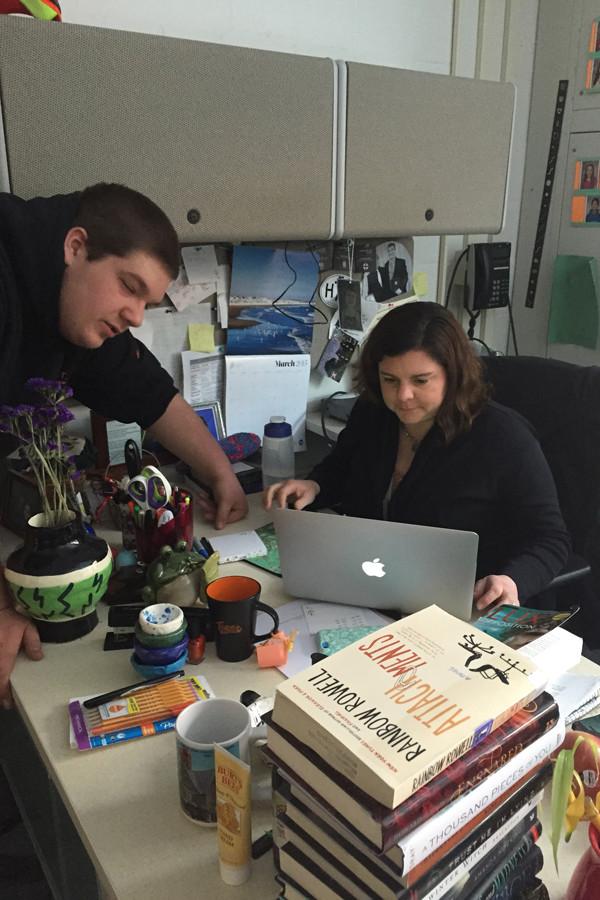A Different Kind of Lesson
How teachers balance students’ personal and academic needs
Mar 10, 2015
Teaching and parenting are two different job titles, but in the halls at Biddeford High School the differences become less apparent as teachers try to meet all the needs of their students.
Relationships made by some of the students and teachers at BHS may play a large role in their students’ academic success.
“You could say Mrs. Auten is like my mom of the high school,” said senior Seth Bergeron. “She definitely helped me pass high school, without her I wouldn’t be able to graduate.”
Psychology teacher Rebecca Auten-Grenier has a philosophy of teaching and parenting that helps kids get by.
“A teacher should know the student well enough both as a learner and a person, so if the kid has a personal issue going on that’s affecting school the teacher should know how to support them.” said Auten. “At the same time make sure they’re doing what they need to do to complete their credits and graduate.
Not only is she helping her students pay more attention to schoolwork, but she and other teachers are helping students feel more comfortable at school. English teacher Jayne Sheltra takes a different approach.
“Some teachers are more comfortable with some of the social drama that goes around with kids like break-ups and make-ups and manage to deal with that in a helpful manner,” said Sheltra. “I think that that’s beneficial, but not all teachers are comfortable with that sort of friend or mentor step, like me, but I think it’s good that there are teachers around that do that.”
The line for communication is always safeguarded for Auten and colleague and math teacher Michelle Dion-Bernier who keep in mind the same rule when talking to students.
“I always pretend when I’m communicating with kids that Mr. Sirois and the child’s parents are in the room,” said Auten. “I would never say something to a child in any context that I wouldn’t say in front of my boss or their parents, and that’s where I know my comfort zone is.” Dion-Bernier agrees that she handles these situations the same way.
For some teachers in our school having their own children as part of the student body adds a wild card into the mix.
“With Makayla in school I make sure that any drama I hear never gets told to her and any drama she hears isn’t shared with me, unless it concerns her,” Dion-Bernier said.
With two children in school Sheltra’s knowledge of the student body has grown.
“It was easier when I just had Jillian in school, just one, but now with both girls in school here with me it’s definitely different,” said Sheltra. “I knew a few of Jillian’s friends growing up and now Jillian’s friends and Josie’s friends and friends of their friends’ cousins and relatives, it’s so much bigger now.”
Though she knows much of the student body through her childrens’ eyes, she remains professional when giving advice.
“I will listen to a student with any issue but I always say up-front to kids, ‘If I can’t help you with this we need to find someone who can, and just so you know we may go the next step,’” Sheltra said.
Sometimes within these student-teacher relationships problems arise that are delicate to deal with, which is when it’s most important to keep the dialog open. Auten thinks that keeping communication open is especially important because, “they could be homeless…they could be in an abusive relationship and we don’t know.”
“When you send the message to a student that you’re uncomfortable with them sharing you’re blocking off that avenue of communication, and there’s a lot of kids that have a lot of serious issues going on here,” said Auten. “If we get that kind of information it’s important we deal with it in the right way.”
Though students need help sometimes they’re less apt to ask for it from someone who has to hand information up to the principal or to guidance counselors.
“Even when a kid wants to talk to you it’s hard to remember to tell the students, you need to know I’m so glad that you’re telling me these things but we need to have supports in place,” said Sheltra. “ I think it’s hard because this keeps students from opening up to teachers because they know it’s not like talking to a friend where it ends there. With teachers it has to go a little beyond some of the time.”
Choosing to confide in a teacher may result in having to take the next step, but overall many believe that good things come from the relationships teachers and students build together.
“If I didn’t have a strong student-teacher relationship with Mrs. Auten I would feel somewhat like the school was untrustworthy,” said senior Ashton Collins. “You always need someone to look out for you.”


